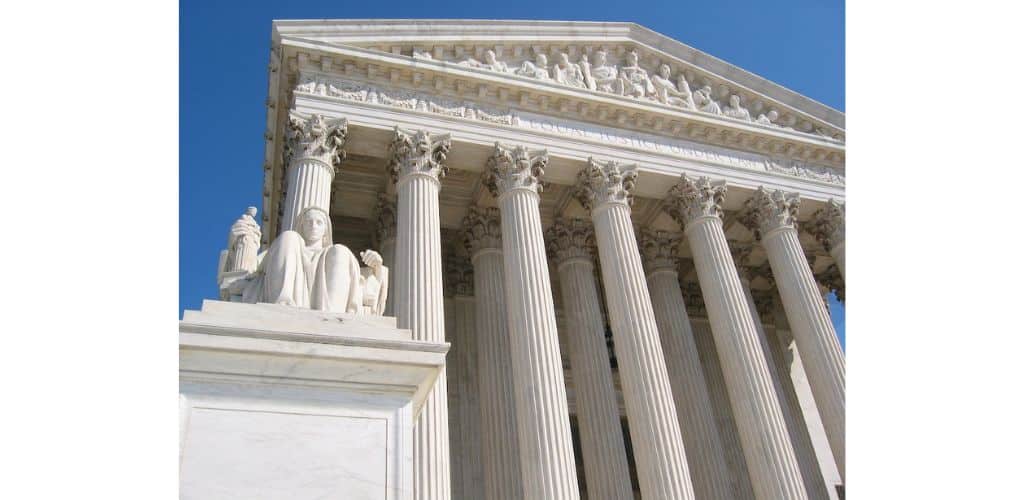The US Supreme Court has declined to hear a petition on the issue of whether artificial intelligence (AI) can be considered an inventor on a patent.
As we discussed in this blog, in 2019 Stephen Thaler sought patent protection for two “inventions” generated by an AI system he calls a “Device for the Autonomous Bootstrapping of Unified Science” (DABUS).
The two patent applications, U.S. Application Nos. 16/524,350 (teaching a “Neural Flame”) and 16/524,532 (teaching a “Fractal Container”) listed DABUS as the sole inventor.
Rather than listing the inventor’s name, Thaler wrote on the patent applications that “the invention [was] generated by artificial intelligence.”
The US Patent and Trademark Office (USPTO) denied the applications on the grounds that they were incomplete for failing to list a valid inventor. The USPTO then sent Thaler a “Notice to File Missing Parts of Nonprovisional Application” for each application and requested that he identify valid inventors.
Thaler responded with a petition to vacate the notices.
The USPTO denied this on the basis that “a machine does not qualify as an inventor.”
Thaler then appealed to the Federal Circuit, which noted that:
The Patent Act expressly provides that inventors are “individuals.” Since 2011, with the passage of the Leahy-Smith America Invents Act, the Patent Act has defined an “inventor” as “the individual or, if a joint invention, the individuals collectively who invented or discovered the subject matter of the invention.” …
The Patent Act doesn’t define “individual.” However, courts including the US Supreme Court have defined the term to mean “a human being, a person.”
The Federal Circuit also noted that the Patent Act “does not also use “itself,” which it would have done if Congress intended to permit non-human inventors.
(Of course, until recently it’s unlikely that Congress would have even anticipated non-human inventors.)
Thaler filed a petition for a writ of certiorari with the Supreme Court, and the Court declined to hear it, meaning that the lower court’s decision is now final.
US law denying inventorship by AI is in keeping with similar decisions in the EU, the UK, and Australia.
However, a South African court, in a case also brought by Thaler, has stated that an AI can be named as an inventor in a patent application.
As we discussed in this recent blog, an AI also cannot be an “author” for the purposes of copyright law.
Under a new Copyright Office policy,
applicants have a duty to disclose the inclusion of AI-generated content in a work submitted for registration and to provide a brief explanation of the human author’s contributions to the work.
A dispute over AI-generated works is also one of the key issues in the current strike by the Writers Guild of America (WGA) against the Alliance of Motion Picture and Television Producers (AMPTP), which bargains on the behalf of production companies.
The WGA negotiates a new contract (the Minimum Basic Agreement, or MBA) with the AMPTP every three years. This year, one of the WGA proposals on the table was:
Regulate use of artificial intelligence on MBA-covered projects: AI can’t write or rewrite literary material; can’t be used as source material; and MBA-covered material can’t be used to train AI
The AMPTP rejected the proposal outright and countered by offering annual meetings to discuss advancements in technology, which many in the WGA considered insulting.
As Time pointed out,
The last time the Writers Guild of America went on strike, in 2007, workers pushed back against the nascent streaming industry, advocating for higher residual payments for content released over streaming. Now a new technology, artificial intelligence, stands to drastically change Hollywood again as Guild strikers return to the picket line.
Similarly, as Time reported,
The Screen Actors Guild-American Federation of Television and Radio Artists (SAG-AFTRA) released a statement in March requiring the bargaining of the use of artificial intelligence to simulate an actor’s performance, noting that “human creators are the foundation of the creative industries and we must ensure that they are respected and paid for their work.” And just a week after Universal Music Group asked services to prevent AI companies from “scraping” music to create imitations, an AI-created Drake and The Weeknd collab fooled the Internet.
Just like the haiku above, we like to keep our posts short and sweet. Hopefully, you found this bite-sized information helpful. If you would like more information, please do not hesitate to contact us here.


